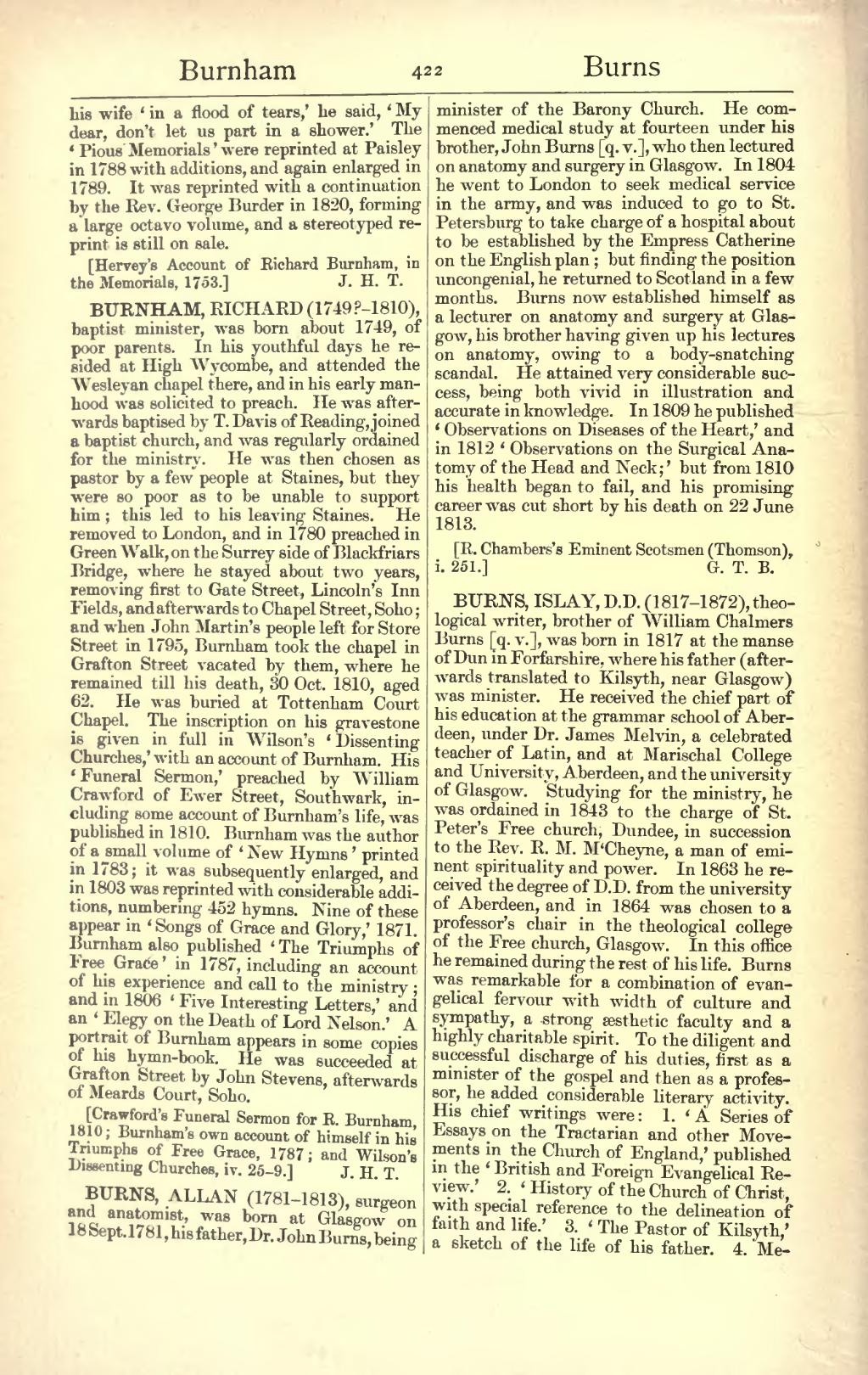his wife ‘in a flood of tears,’ he said, ‘My dear, don't let us part in a shower.’ The ‘Pious Memorials’ were reprinted at Paisley in 1788 with additions, and again enlarged in 1789. It was reprinted with a continuation by the Rev. George Burder in 1820, forming a large octavo volume, and a stereotyped reprint is still on sale.
[Hervey's Account of Richard Burnham, in the Memorials, 1753.]
BURNHAM, RICHARD (1749?–1810), baptist minister, was born about 1749, of poor parents. In his youthful days he resided at High Wycombe, and attended the Wesleyan chapel there, and in his early manhood was solicited to preach. He was afterwards baptised by T. Davis of Reading, joined a baptist church, and was regularly ordained for the ministry. He was then chosen as pastor by a few people at Staines, but they were so poor as to be unable to support him; this led to his leaving Staines. He removed to London, and in 1780 preached in Green Walk, on the Surrey side of Blackfriars Bridge, where he stayed about two years, removing first to Gate Street, Lincoln's Inn Fields, and afterwards to Chapel Street, Soho; and when John Martin's people left for Store Street in 1795, Burnham took the chapel in Grafton Street vacated by them, where he remained till his death, 30 Oct. 1810, aged 62. He was buried at Tottenham Court Chapel. The inscription on his gravestone is given in full in Wilson's ‘Dissenting Churches,’ with an account of Burnham. His ‘Funeral Sermon,’ preached by William Crawford of Ewer Street, Southwark, including some account of Burnham's life, was published in 1810. Burnham was the author of a small volume of ‘New Hymns’ printed in 1783; it was subsequently enlarged, and in 1803 was reprinted with considerable additions, numbering 452 hymns. Nine of these appear in ‘Songs of Grace and Glory,’ 1871. Burnham also published ‘The Triumphs of Free Grace’ in 1787, including an account of his experience and call to the ministry; and in 1806 ‘Five Interesting Letters,’ and an ‘Elegy on the Death of Lord Nelson.’ A portrait of Burnham appears in some copies of his hymn-book. He was succeeded at Grafton Street by John Stevens, afterwards of Meards Court, Soho.
[Crawford's Funeral Sermon for R. Burnham, 1810; Burnham's own account of himself in his Triumphs of Free Grace, 1787; and Wilson's Dissenting Churches, iv. 25–9.]
BURNS, ALLAN (1781–1813), surgeon and anatomist, was born at Glasgow on 18 Sept. 1781, his father, Dr. John Burns, being minister of the Barony Church. He commenced medical study at fourteen under his brother, John Burns [q. v.], who then lectured on anatomy and surgery in Glasgow. In 1804 he went to London to seek medical service in the army, and was induced to go to St. Petersburg to take charge of a hospital about to be established by the Empress Catherine on the English plan; but finding the position uncongenial, he returned to Scotland in a few months. Burns now established himself as a lecturer on anatomy and surgery at Glasgow, his brother having given up his lectures on anatomy, owing to a body-snatching scandal. He attained very considerable success, being both vivid in illustration and accurate in knowledge. In 1809 he published ‘Observations on Diseases of the Heart,’ and in 1812 ‘Observations on the Surgical Anatomy of the Head and Neck;’ but from 1810 his health began to fail, and his promising career was cut short by his death on 22 June 1813.
[R. Chambers's Eminent Scotsmen (Thomson), i. 251.]
BURNS, ISLAY, D.D. (1817–1872), theological writer, brother of William Chalmers Burns [q. v.], was born in 1817 at the manse of Dun in Forfarshire, where his father (afterwards translated to Kilsyth, near Glasgow) was minister. He received the chief part of his education at the grammar school of Aberdeen, under Dr. James Melvin, a celebrated teacher of Latin, and at Marischal College and University, Aberdeen, and the university of Glasgow. Studying for the ministry, he was ordained in 1843 to the charge of St. Peter's Free church, Dundee, in succession to the Rev. R. M. M'Cheyne, a man of eminent spirituality and power. In 1863 he received the degree of D.D. from the university of Aberdeen, and in 1864 was chosen to a professor's chair in the theological college of the Free church, Glasgow. In this office he remained during the rest of his life. Burns was remarkable for a combination of evangelical fervour with width of culture and sympathy, a strong æsthetic faculty and a highly charitable spirit. To the diligent and successful discharge of his duties, first as a minister of the gospel and then as a professor, he added considerable literary activity. His chief writings were:
- ‘A Series of Essays on the Tractarian and other Movements in the Church of England,’ published in the ‘British and Foreign Evangelical Review.
- ‘History of the Church of Christ, with special reference to the delineation of faith and life.’
- ‘The Pastor of Kilsyth,’ a sketch of the life of his father.
- Me-
